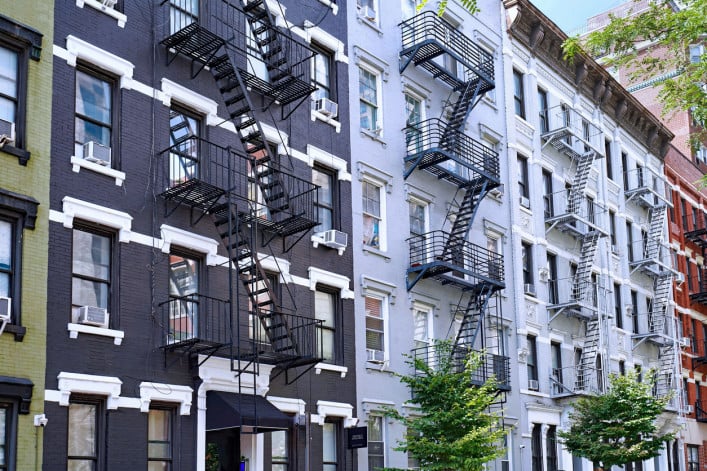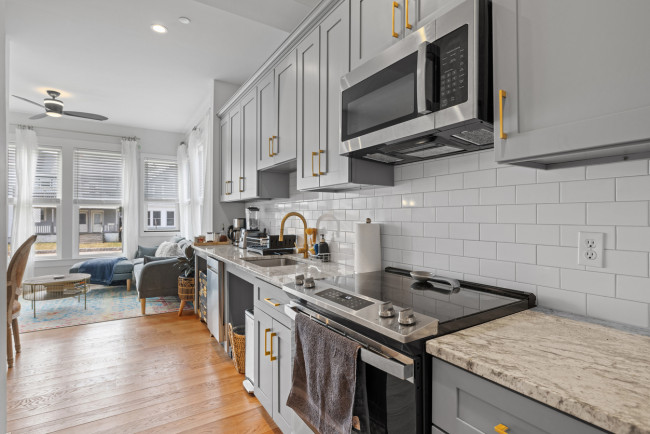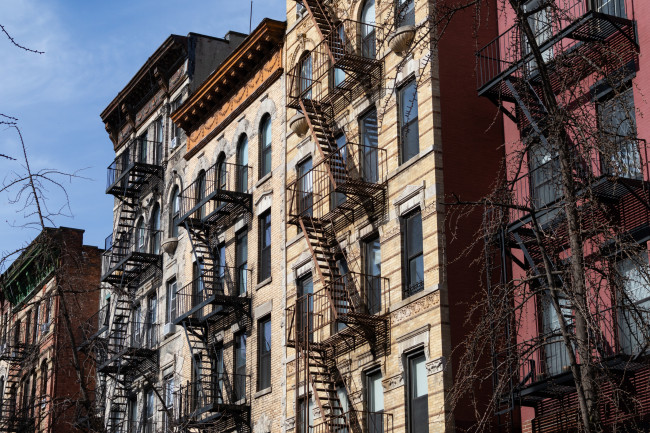New landlord: 10 tips if you're renting out a NYC apartment for the first time
- There are new laws changing how broker fees and background checks are handled

The Fairness in Apartment Rentals (FARE) Act went into effect this year. It shifts responsibility for most broker fees from the renter to the landlord.
iStock
Becoming a landlord can provide income to offset the expenses of owning a place in New York City—like your mortgage and maintenance payments—but a lot goes into your role. If you’re renting out your apartment for the first time, you must know New York's rental laws, prepare a comprehensive lease, and ensure adequate insurance coverage.
Be prepared for a steep learning curve. Even if you’re used to the responsibility of owning your own home, making the transition to maintaining housing for someone else is a whole new ballgame.
[Editor's note: A previous version of this article was published in October 2024. It has been updated with new information for October 2025.]
As a beginner landlord, your goal will be to find financially qualified and responsible tenants. You must also know what’s allowed under state and city laws and your building’s rental or sublet rules.
1) Understand New York’s rent laws
Your first step is to familiarize yourself with the rent laws. The Housing Stability & Tenant Protection Act of 2019 added new protections for market-rate renters, similar to protections for rent-stabilized tenants. This will affect how you operate your rental, so it’s worth reading up on the rules. Listen to: "How NYC’s new rent reforms affect you even if you’re not a stabilized tenant."
The Fairness in Apartment Rentals (FARE) Act went into effect this year. It shifts responsibility for most broker fees from the renter to the landlord—representing a major change for the NYC rental market, which has been an outlier in having renters compensate brokers hired by landlords. The fee ranges from one month's rent to 15 percent of the annual rent, so the law removes a significant upfront cost to renters.
In response, landlords have been raising rents to absorb the cost of commissions, in effect spreading the cost over the term of the lease—and sending rents for new leases to record highs each month. See: "FARE Act takes effect: What NYC renters need to know about the new broker fee law."
New York's new Good Cause eviction law protects many market-rate tenants from eviction and extreme rent increases (currently set at above 8.82 percent.) That means that a tenant whose building is covered by Good Cause can challenge in court a rent increase over 8.82 percent. For more details, see: "Everything you need to know about New York’s Good Cause eviction law."
Good Cause requires a landlord to renew a lease unless the owner has a "good cause" to evict the renter, such as failure to pay rent (excluding an unreasonable rent hike). You must notify tenants if the apartment is covered under the policy—or why a building is exempt—through a rider attached to the lease. There are many exemptions, so check out: "How to tell if your NYC apartment building is protected by the new Good Cause eviction law."
The 2019 rent reforms changed how much landlords can charge potential tenants for background checks and added new rules for notification of rent increases and lease terminations.
For example, if you want to increase the rent by 5 percent or more at lease renewal time, you must give your tenants advance written notice—and the notice period depends on how long tenants have been in place. This also applies if you’ve let the lease lapse and have month-to-month tenants. Tenants must receive 30-days notice if they have lived there for less than a year, 60-days notice for a year or more, and 90 days if it’s been more than two years.
As a landlord, you cannot charge more than $20 for an application fee. This cost covers the background and credit check, which you must supply to your incoming tenant with a receipt.
Some co-op and condo boards impose additional fees on owners, calculated either as a percentage of an apartment’s monthly maintenance or a percentage of the rent. The fee might also include move-in costs covering the use of the elevator for a day and can fall anywhere between $350 and $3,500, depending on the building. You can pass these fees to the new tenant.
Another consideration is a cap on late fees. NYC law states that penalties for late rent payments can only be assessed if tenants are more than five days late, and the fine is limited to $50 or 5 percent of the monthly rent, whichever is the lower amount. Setting up a rent collection method online can be helpful.
Landlords can no longer require more than one month's rent as a security deposit. For the details, read: “Can a landlord ask for the first and last month’s rent plus a security deposit?” (The answer is still no.)
Also, your tenant has the right to have the apartment inspected and its condition documented before they move in. When the tenant moves out, they can request another walkthrough, and you’ll need to give an itemized statement of any charges you intend to take out of the security within 14 days. If you don’t meet this deadline, you forfeit any right to keep part of the deposit.
Some of these requirements can be intimidating for new landlords, and you might want to consider teaming up with other landlords. Consider starting or joining a networking group to learn from other landlords’ experiences.
The Agency's Off-Market Advantage
Discover off-market investment properties in your ideal neighborhood that perfectly suit your needs and budget. Meet and deal with sellers before their apartment or building hits the market.


Let The Agency's off-market team give you exclusive access to properties in your price range and desired neighborhood that no one else has seen. More options, less competition, no bidding wars.
2) Do background checks in the right order
First-time landlords should be aware that NYC has a new law that makes it illegal for most landlords, brokers, and housing providers to deny someone an apartment based solely on their conviction history.
The Fair Chance for Housing Act (FCHA), also known as Local Law 24, took effect in January and it is aimed at preventing housing discrimination against renters who have a criminal conviction and have served their time, a bias that is a leading cause of housing instability and homelessness.
“NYC is one the most difficult markets to find housing. People who have a conviction in their history have yet another barrier. A criminal history means someone is 10 times more likely to become homeless,” said Diane Johnston, an attorney with the Legal Action Center, which was part of the coalition that pushed for the law.
What this means in practical terms is that owners are limited to a narrow “look-back window.” Landlords, as well as co-op and condo boards, can not consider felony convictions older than five years and misdemeanor convictions older than three years. One- and two-family owner-occupied houses are exempt.
When vetting tenants, landlords must review their financial worthiness first. They should consider an applicant’s credit score, income, tenant history, essentially pre-qualifying a tenant first and then make a conditional offer of a lease.
A criminal background check, if a landlord or board chooses to do one, is supposed to take place after the credit check, and applicants must give their permission, be informed of their rights under the Fair Chance for Housing Act, and receive a copy of the report.
If an owner decides to reject an applicant based on the criminal background, they have to do so in writing, explaining how the criminal history impacted the decision.
Tenants should be given a chance to respond, Johnston said.
In this case, they should “submit supporting information that explains who you are today and why you would be a good tenant,” she said, adding, “we encourage people to prepare this in advance.”
The goal is to consider the financial and housing history of tenant first. If you were to check a renter’s credit and criminal histories simultaneously, or in the wrong order, you could get in hot water. A renter who has poor credit may allege that you are rejecting them because of a criminal conviction.
3) Know your co-op or condo sublet rules
If you own a townhouse or condo, you are free to rent it out. Unlike in a co-op, you own the property rather than a share of the building, and that means there are no sublet issues.
If you want to rent out a co-op, however, the board’s rules and regulations will determine what’s allowed.
The board will also typically be involved in the approval process and can deny your rental applicant without giving a reason. The board can also dictate the length of the lease and even the price you can charge. You’ll need to read the co-op’s proprietary lease to find out about any restrictions.
In a rent-regulated co-op, sublets will probably be significantly more difficult.
“While many people in Mitchell-Lama and other government-regulated apartments do sublet, it’s generally not allowed,” says Dean Roberts, a real estate attorney at Norris McLaughlin. “There are certain nuances about family members living there while you are away—if you are in the military, for example, but straight-forward commercial sublets are not allowed,” he says.
And if your place is rent-stabilized but no longer your primary residence, you risk eviction if you rent the place out.
If you are a renter in a building with more than four units, you have the right to sublet but must ask permission at least 30 days in advance.
Subletting assumes you plan on returning to the apartment, and you will take responsibility for rent payments. In your communication with your board, clearly state the terms of the sublease, including details about the tenant and the length of time they’ll be in the apartment. If they do not respond within 30 days, New York law considers that consent.
Note that renting out your place for longer than the term of your original lease may be considered an assignment, where you’d be handing off the lease to a new tenant and don’t intend to return. For more, read: “What’s the difference between a sublet and an assignment?”
4) Make sure building documents are up to date
Even if you have the right to rent out your co-op, condo, or townhouse unit, it’s worth making sure your paperwork is in order.
For example, check the status of your certificate of occupancy—the document that determines how your building can be occupied. It makes sense to find out what the C of O says before you buy a townhouse or duplex, because if your purchase depends on you being able to rent out the ground-floor apartment of a brownstone, the C of O needs to identify the building as a legal two-family. For additional information, check out: “What's a certificate of insurance, and when is it necessary?”
If you're renting out a unit and the C of O doesn't cover the apartment for residential use, that's a violation, and you can't collect rent. The more likely scenario is that your tenants would get wind of this paperwork problem, and would be well within their rights to stop paying you.
5) Avoid illegal short-term rentals
You can’t rent out an entire apartment for fewer than 30 days without also residing there. The rationale behind NYC's very restrictive short-term rental rules is to make sure as many apartments as possible are available for people who want to rent in the city long-term.
Read: "Want to list your place on Airbnb or other short-term rental sites? Read this FAQ for New Yorkers first" for more details.
6) Know how much rent you should ask for
If you are subletting a rent-regulated apartment, you aren’t allowed to profit by charging a higher rent than what you're already paying. If your apartment is furnished, you can charge up to 10 percent of your rent for the use of the furnishings.
If you’re renting out a market-rate apartment, you can charge whatever the market will bear. Compare asking rents on aggregated listing sites.
Generally, if you're offering a rental during the slower winter months, you may want to offer a concession, like an additional month or two of free rent.
7) Find good tenants who will pay the rent on time
Finding a renter who's financially qualified and responsible is going to save a lot of headaches.
Brokers recommend going the extra mile by requiring and calling references and following through on credit checks. It’s also important to follow up on personal references, especially since you can no longer use information from NYC housing court to reject a tenant.
Many NYC leasing agents and landlords want to see a potential tenant earn an annual salary of 40 times the monthly rent. Screening companies can run credit checks on your preferred tenant to see if they meet your standards, but remember—you can only ask the tenant to reimburse you $20.
Rent payment histories don’t show up on credit reports, so ask for a letter of reference from a previous landlord, as well as references from employers or other professional contacts.
Pre-pandemic, renting to students and foreign residents presented some challenges, no matter how credit-worthy or asset-rich they were. International visitors often don’t have U.S. credit. Self-employed, retired, or non-employed people with cash assets also won’t meet the traditional financial criteria for renters. International travel is still restricted so it may be several more months before foreign renters start to enter the market again.
If you are considering renting to someone in this category, or if you simply want extra protection, (and bearing in mind you cannot ask for additional security), you may want to ask for a guarantor. Landlords typically look for a relative who lives in the tri-state area (and sometimes only in New York) who can provide proof of income that is twice the income requirement for the prospective tenant, or an annual income of 80 to 90 times the monthly rent.
If your renters don't have a guarantor or you don't want to go through the expensive hassle of suing a personal guarantor in the event that your renter defaults, consider requiring your renter to pay for a third-party guarantor, which guarantees the leases at no cost to the landlord.
8) Make sure the lease terms and riders are clear
You'll need a lease that carefully lays out terms such as price, length of occupancy, type of occupancy (i.e. number of people), move in/move out dates, damages, deposits, and extras such as responsibility for utilities.
Most problems can be avoided by providing clarity on both sides, being open to negotiation, and paying close attention to the amount of time the managing agent states they’ll need to provide approval.
You may need to customize the lease with riders outlining your specific conditions, which might include an early termination clause, policies about pets, smoking, subleasing, or maintenance. Consider consulting an attorney on this. This is one area where it's much better to spend a little extra money on a lawyer to make sure you've got everything covered.
9) Know what repairs landlords are responsible for
If something breaks as a matter of normal usage, the landlord is responsible for repairs. If damage was caused by the tenant and not due to normal wear and tear, you may charge them for it.
As an owner, you are responsible for not only ensuring that all systems within the unit work—like, plumbing, appliances, and heat—but you must also ensure safety measures are in place such as smoke detectors, carbon monoxide alarms, chain-door guards, and window guards. You must also ensure the door and mailbox have working locks. For more, read: “11 things NYC landlords are required to provide, and 11 they’re not that might surprise you.”
Legally, if you're moving out of your apartment and planning to rent it out, you're also required to provide the tenant with a single phone number they can call for repairs, questions, and emergencies. This can be a hired managing agent, or simply your own personal number. If you want a managing agent to deal with all these details on your behalf, expect to spend about 5 or 6 percent of the rent on their services.
10) Update your apartment insurance
You need to adjust your apartment insurance to reflect that the residence is now rented out and ask your tenant to take out a renter’s insurance policy, too. Your tenant’s contents and liability will not be covered under your policy.
Landlord insurance gives you premises liability—coverage for the inside of the apartment and also for the loss of rent if your tenant is unable to pay because a fire or extensive water damage forces them out.
“The coverage for short-term rentals is, at most, 30-90 days total per year, not for a series of short-term rentals,” says Jeffrey Schneider, president of Gotham Brokerage. “You will either have to endorse your policy or take out a different kind of policy to properly cover yourself when the apartment is rented out."
—Earlier versions of this article contained reporting and writing by Emily Myers and Evelyn Battaglia.
You Might Also Like




























